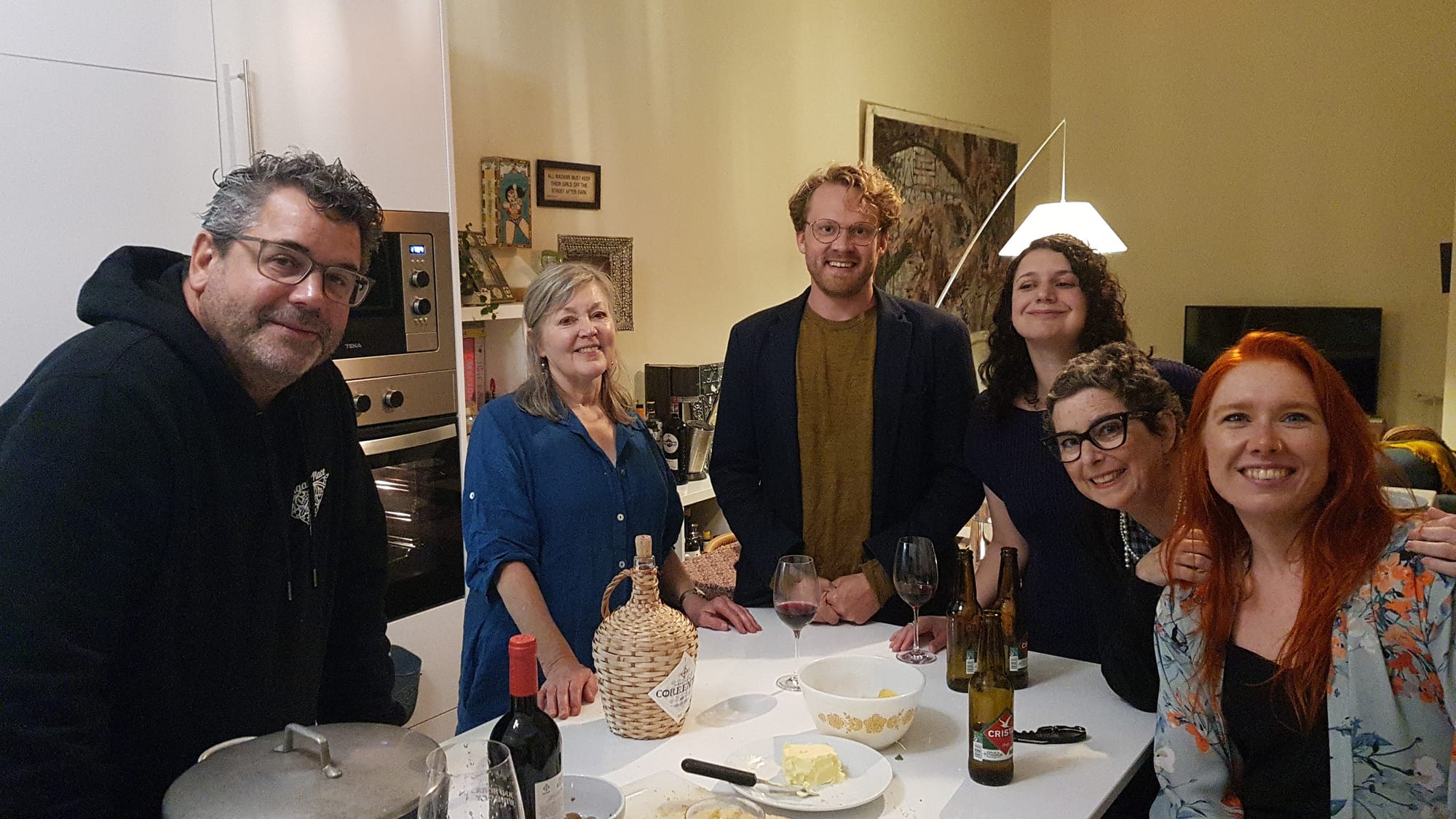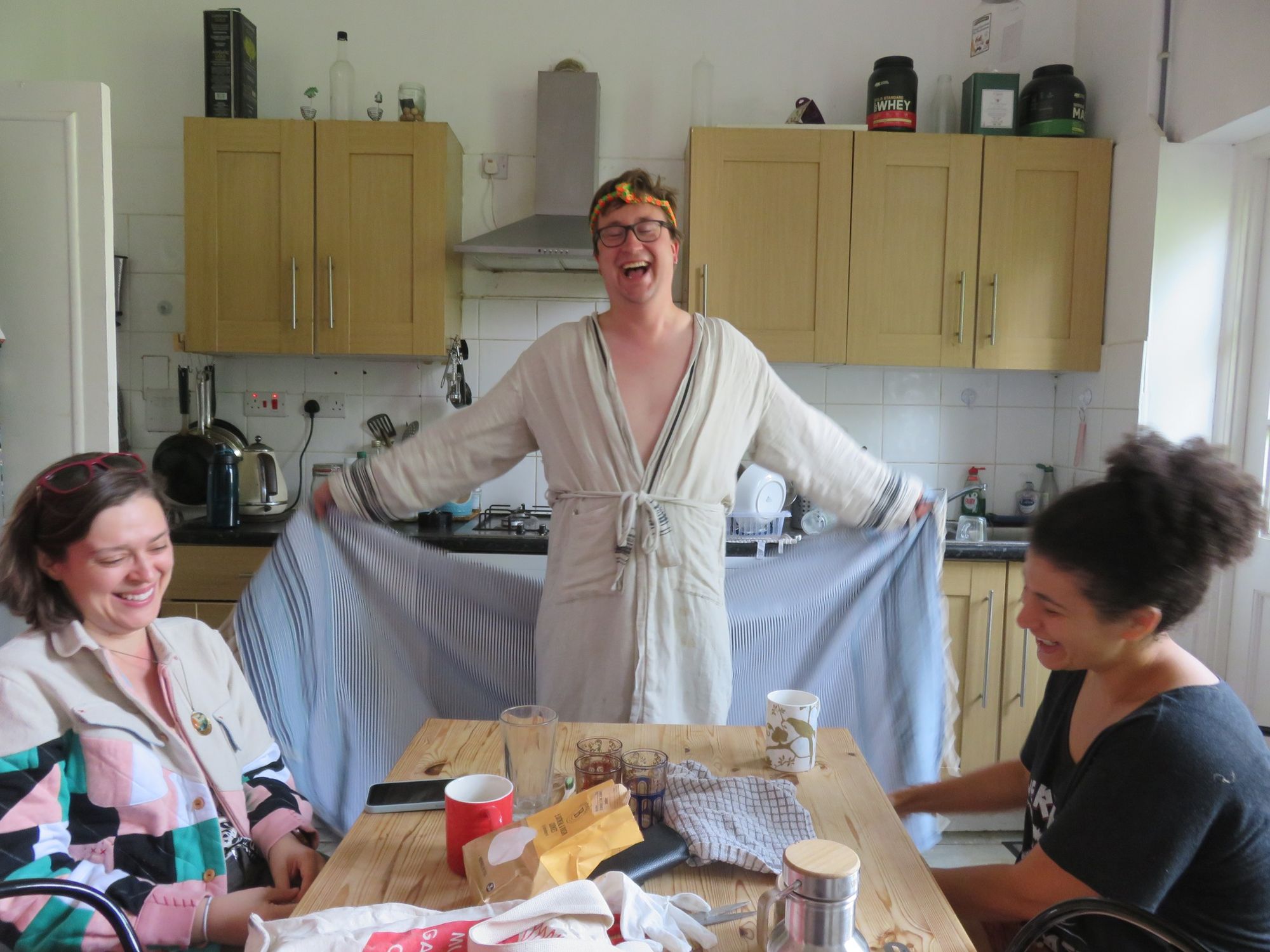A list of things you can eat in Faro
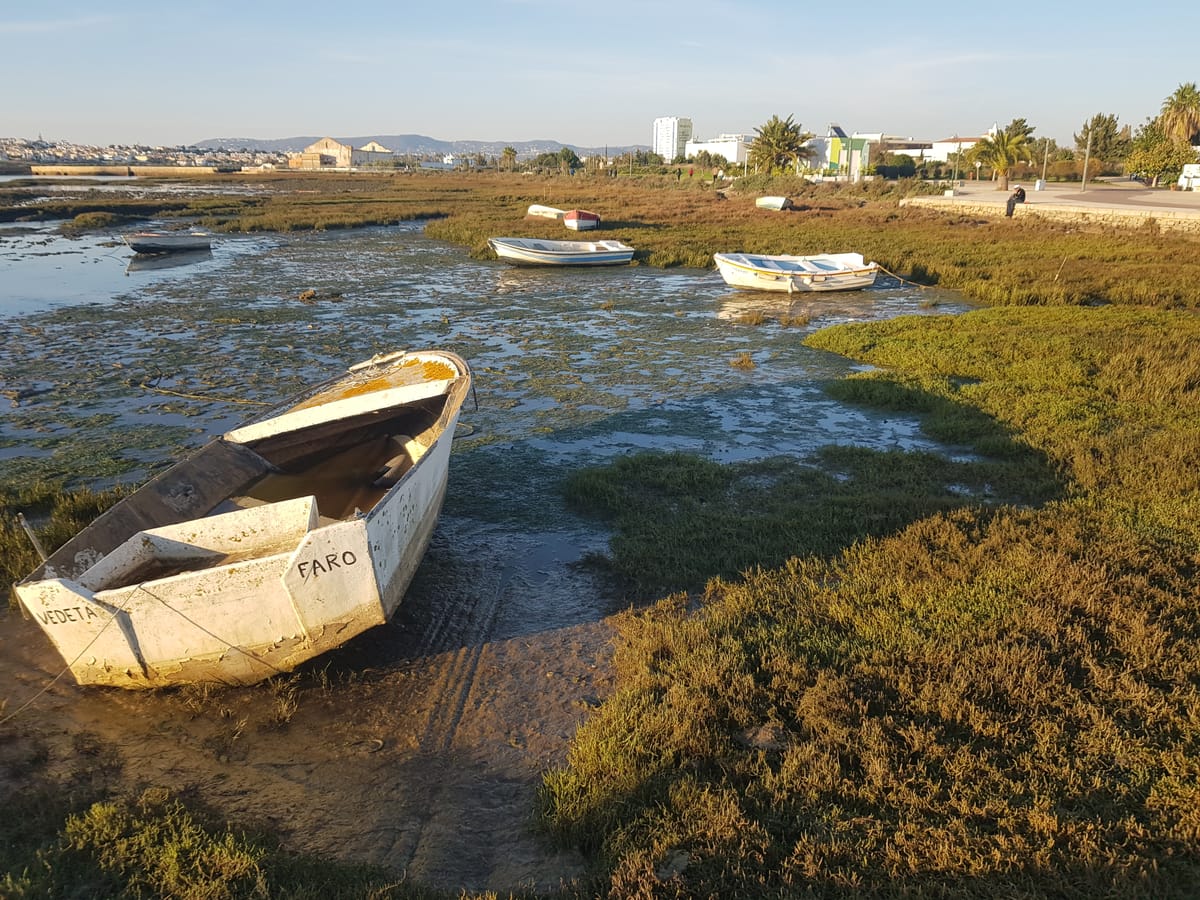
Portuguese food is profoundly unfussy. Throw the stuff together: a meal. It is simple and satisfying. It’s a little different than the Mediterranean diet – which is good in Italy, heartburn-inducing in Spain, and heart-attack-inducing in France – primarily because of all the codfish. They have the Moorish influence with things like almond, carob, and oranges, the holy Mediterranean trinity of olives, wine and wheat, and then the benefit of being some of the first on the spice trade game. They got absurdly wealthy in the colonial era through brutality and theft, and then squandered it all.
I have found that one great tip to having a really good family vacation is to make sure that one of the members of your family lives in a vacation destination. My brother moved to Faro two years ago to play in the orchestra, and now he is a surfer. He watches the surf forecast and the surf cam with precisely the same attention as Dad watched the ski forecast many years ago in Alaska. Rachel and I bought tickets to visit him, as his friends Brian and Jen had invited us for their Thanksgiving, and then Mom decided she would come too. Mom is considering moving to Portugal to be slightly closer to her sons, and because “Alaska is too cold.” Fair point.
We ate many things in Faro that were memorable. Here is a short list.
Frango at the churrasqueria
Frango is chicken. Nobody knows why Portuguese has the word frango instead of pollo or poulet or any of the other latinate equivalents. Etymology completely unknown.
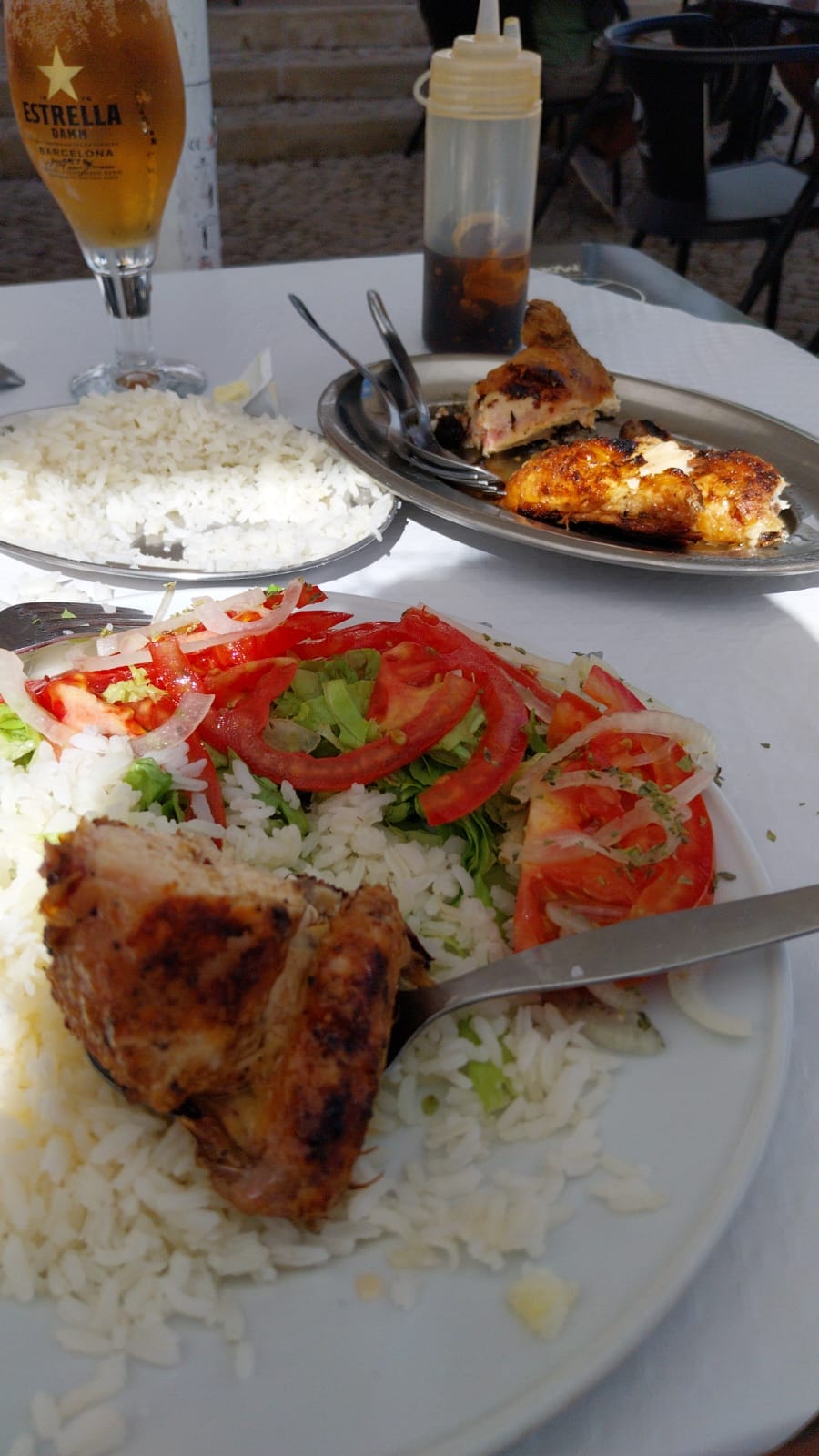
A churrasqueria is a grill house. There are a few in Faro, but there’s only one that anyone cares about. There’s often a line to get a table. I’m sure the guys at other churrasquerias in town go to this churrasqueria on their off days. It’s tiny. There’s about ten tables inside and maybe another ten outside. An old guy stands behind the grill and makes frango the exact same way he’s been making frango since he was but a wee franguette. The frangos are rubbed with Portuguese allspice – a mix featuring orange peel, nutmeg, and paprika – and then barbecued. It’s served with the same sides every single time: rice, salad, fries. (Plus beer.) They have homemade piri-piri oil, with chunks of fried garlic and chili visible through the sides of the squirtbottle, submerged in the dark red oil. As Mom noted, the rice and fries were off last time, but the frango. The FRANGO. It is ALWAYS PERFECT.
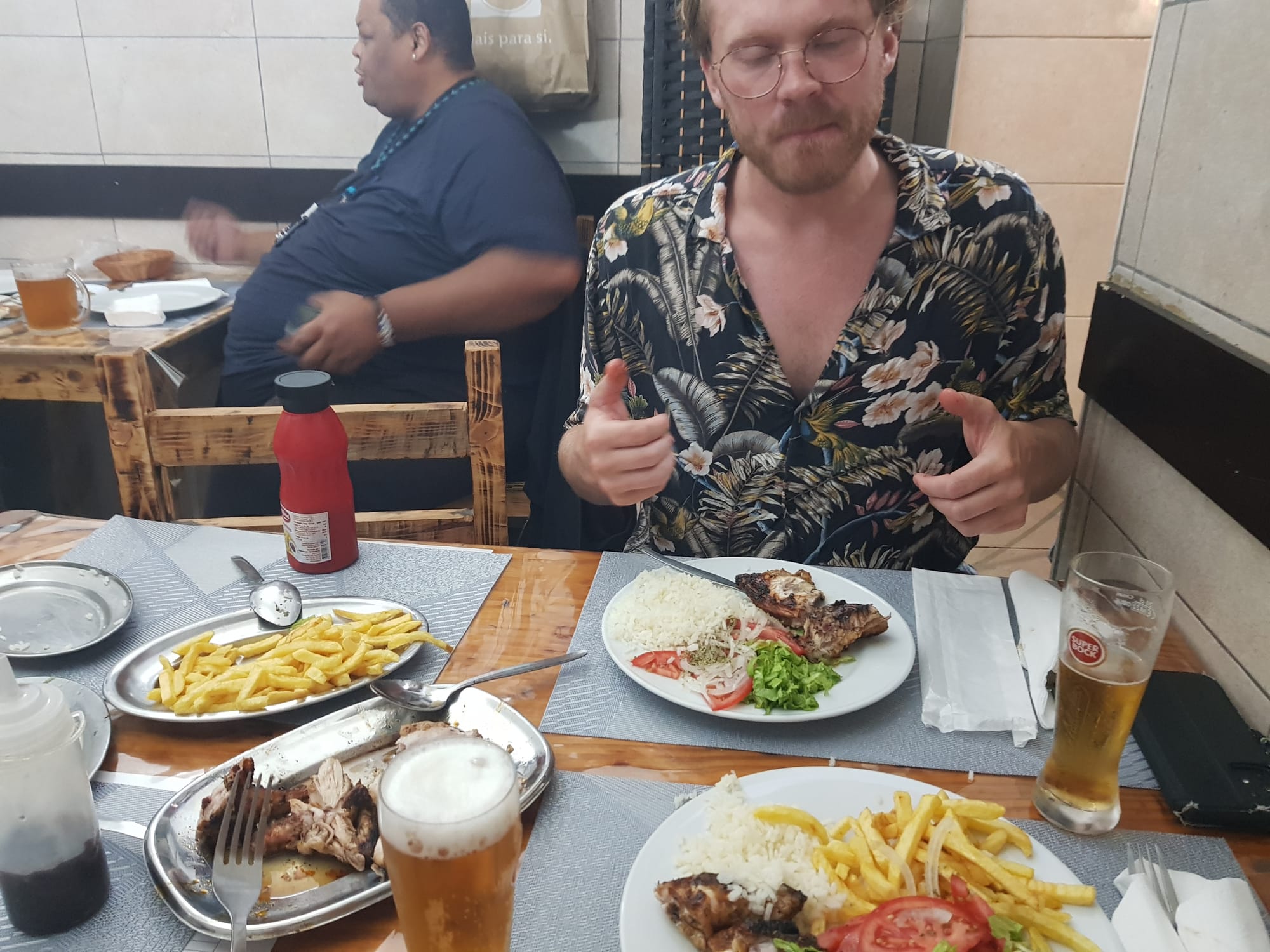
Bifana and a beer
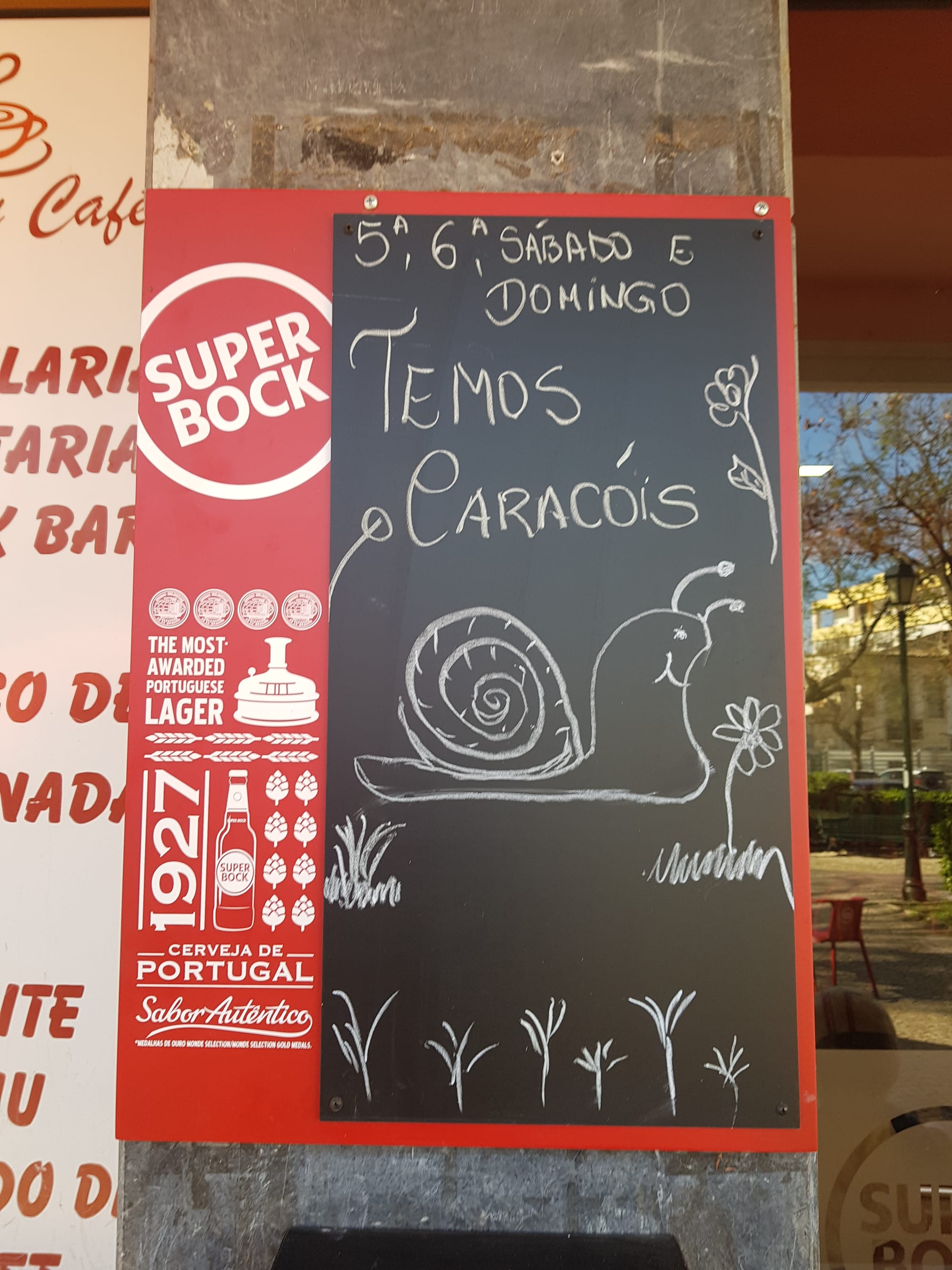
O Seu Cafe (“Your Cafe”) is in the Edificio O Seu Cafe (“Your Cafe Building”). It’s a co-op where all the residents and small businesses have a stake in the cafe. Everyone goes to Your Cafe. It’s in the center-ish of town, in a cobblestone plaza flanked by two rows of arching jacaranda trees, and two churches – one of them has a bone cathedral, and the other hosts a lot of Irish couples on destination weddings. It is open (almost) all day and all night. Beer is one euro. Nearly everyone in town washes up at O Seu Cafe at some point – old winos having their first drink in the morning, elderly tourists taking espresso and staring at their maps, old friends chain smoking and playing cards in the afternoon, school football teams and their accompanying parents feasting on platters of grilled steak and fries, groups of moroccan guys chatting in Arabic over soup and watching ice hockey in Canada on the outdoor TV, students having their final beer of the night. It is the most perfect place on earth.
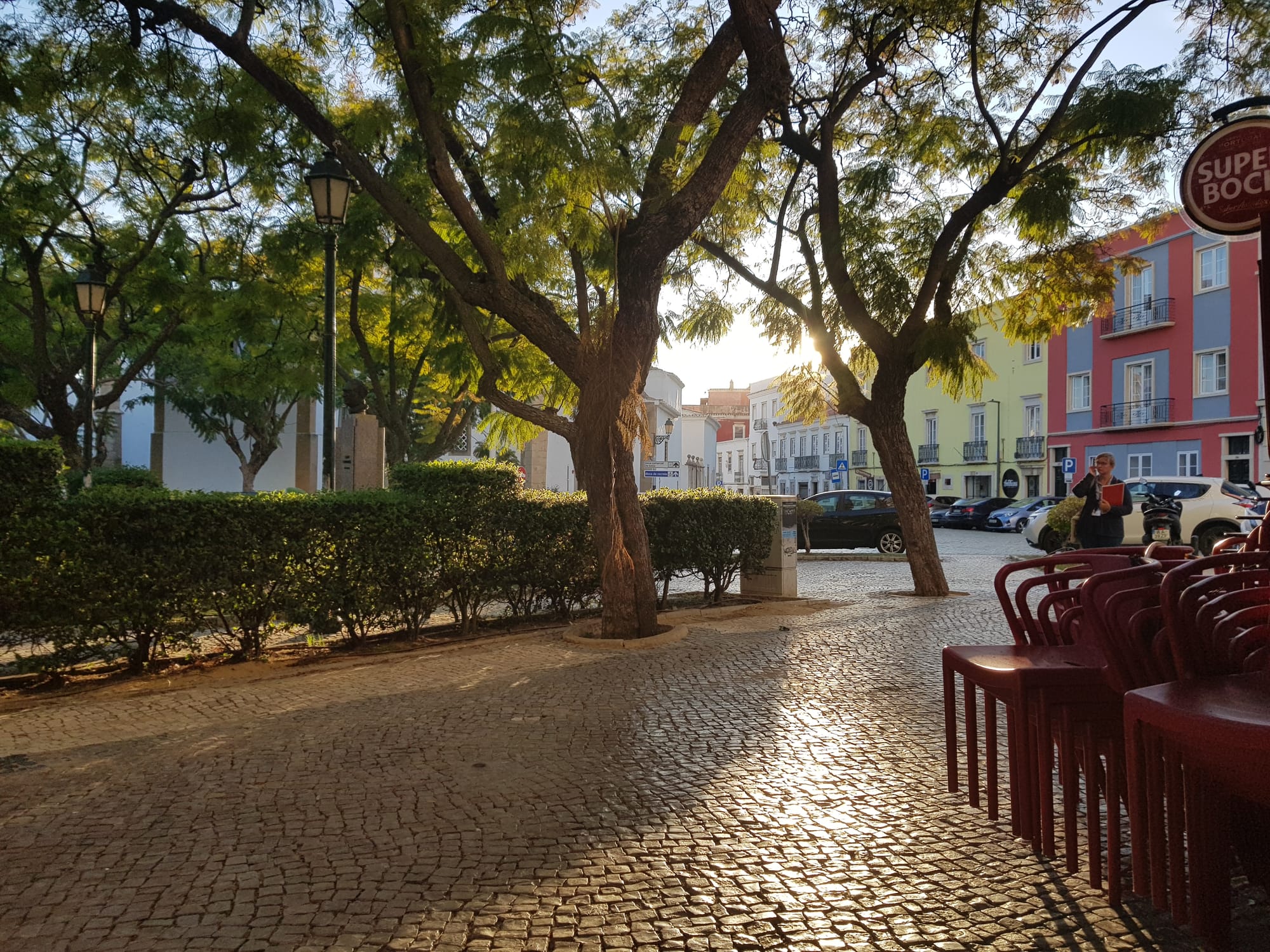
A bifana is a Portuguese sandwich where the only ingredient, besides bread, is a thin slab of pork, marinated and pan-fried in a mixture of olive oil, wine, garlic and bay leaf. You can put mustard or peri peri on it to up the total sandwich components to three. It is the most perfect sandwich on earth.
At O Seu Cafe, a bifana and two small beers is 4.70. I love O Seu cafe.
Cod and Chickpeas
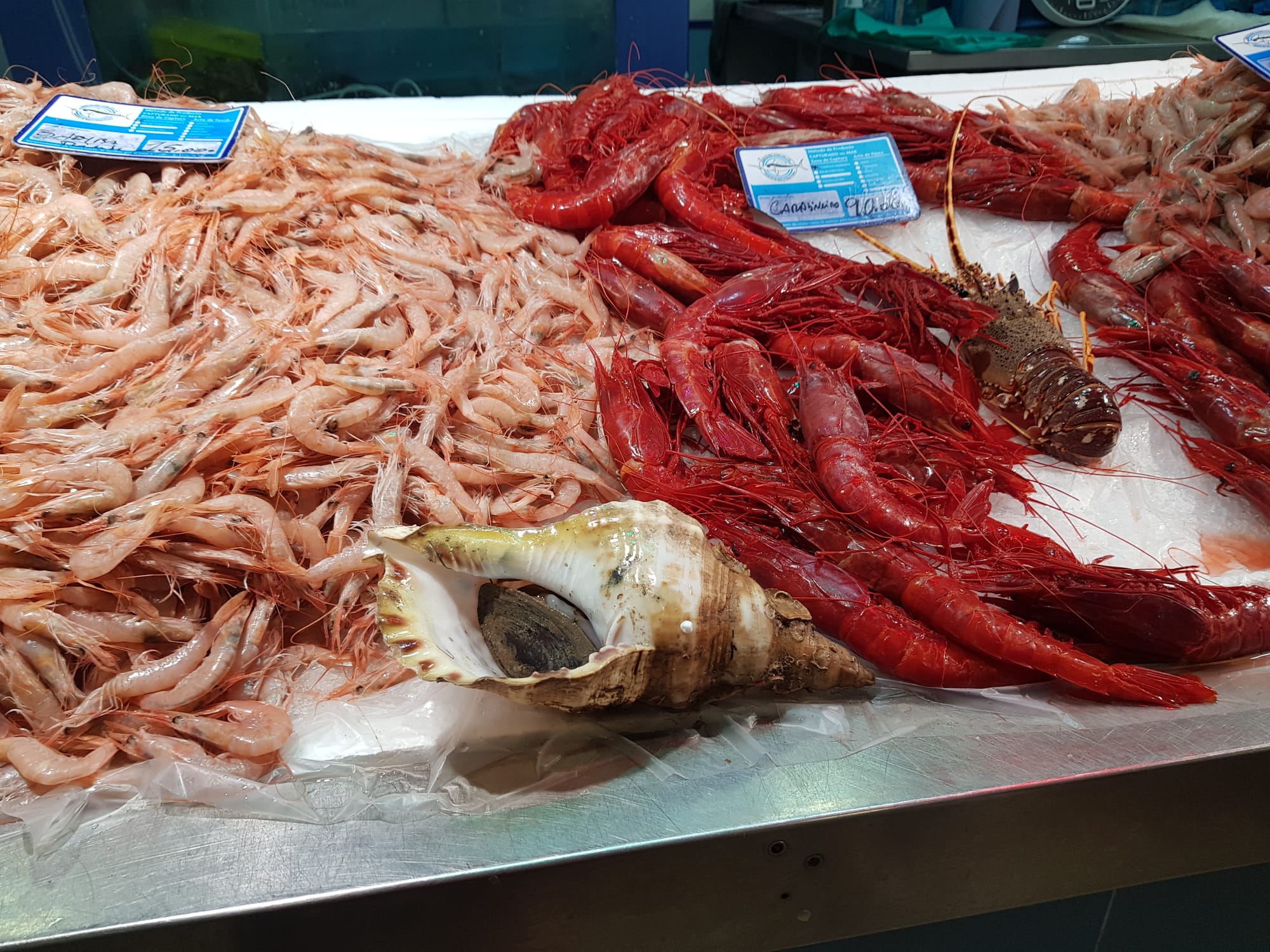
At the Mercado Municipal, you can buy fish, molluscs, fresh vegetables, nuts and honey and dried fruit, and snails. I avoid the snails but get the fish. Shoppers spend their liminal time hanging out at the cafes and bars attached to the market building. The last time I visited, a social club of pensioners, or perhaps just some collegial alcoholics, were having a glass of port at ten in the morning.
O Palacinho is one of the restaurants at the market. It’s a classic sort of old-world lunchtime establishment, casual but elegant, where the waiters are all nimble old guys with big drooping mustaches, they stretch out big paper tablecloths when you order food, and the menu changes every day based on the catch. It was lively and it took us a minute to flag one of the guys down to get some attention (and a small carafe of white wine.)
Next table over were some Americans complaining about Gen Z. “Here in Portugal they speak three languages by the time they’re teenagers, but in America, they can’t even speak English right! ‘No cap,’ ‘dead ass’ and ‘bruh’.”
“In America at least it’s a requirement to have bathrooms in a public facility like this,” said one women in a drawl, getting up on what she clearly anticipated would be a fruitless and aggrieved search for a public toilet.
The menu was also handwritten and, of course, in Portuguese. My comprehension was limited. “Can I have something with pork?” I asked. Or at least I think I did. He understood “pork”, anyways, and brought me a pork steak with an egg on top, with a side of rice and potato chips, which was a bit weird but ok. Rachel got bacalhao com grao, salt cod with chickpeas. It looked basic as could be – a cut of reconstituted cod, chickpeas, some chopped onion as garnish – but the chickpeas were tender, simmered in some kind of broth, and the fish was soft and flaky. Plain, but flavorful and delicious.
A cookie at Bakie
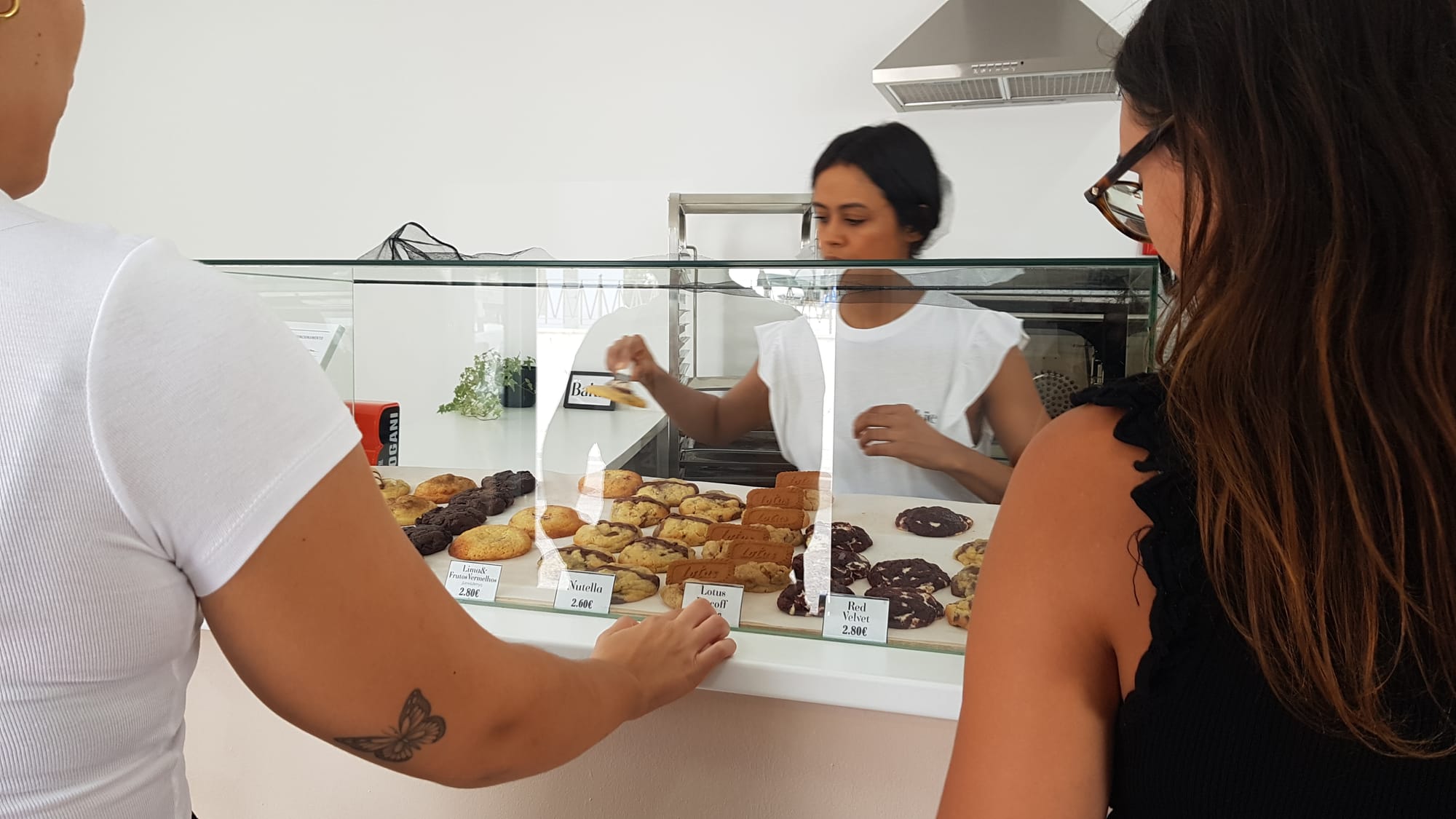
Jari’s friend Brian told us about a bar in Brooklyn in the early 2000s that “had to have been run by the cops”. It was called “Cokie’s”. They did not serve alcohol. Nor any other beverage besides water. You could, however, walk up to the bar and get a big bag of coke (and a glass of water) and sit down at a table with all your friends, pile the coke into the middle, and do lines (and drink water, and grind your teeth) all night. Inexplicably, this New York institution no longer exists.
I only think of it because it rhymes. Bakie could not be less different than Cokie. Bakie is a cookie shop. Andrea, the proprietress (not a cop), makes cookies of her own design, like red velvet and nutella and Kinder Bueno, and people hang out there and chat with her because she’s fun. She makes big portions of dough and then stores them in a fridge so she can bake them in small batches so they're always fresh in the display case, and she always lets you pick out the exact one you want. She jumps at the chance to speak English with her expat customers, and helps out Jari with his Portuguese practice.
Andrea said she'd picked up a copy of a Jordan Peterson book to try and learn English, but, she said, "the writing is not very clear."
Eternal fish
In Faro there is a restaurant (actually, several restaurants) where you pay them 15 euros per person and then they bring you endless fish. This is kind of a gimmick and also kind of a good deal for the restaurant. You can go out to eat in this town at a traditional place and spend 25 Euros for two, so $30 ~ plus drinks ~ actually would make sense for a profit margin. If it were a sane amount of fish.
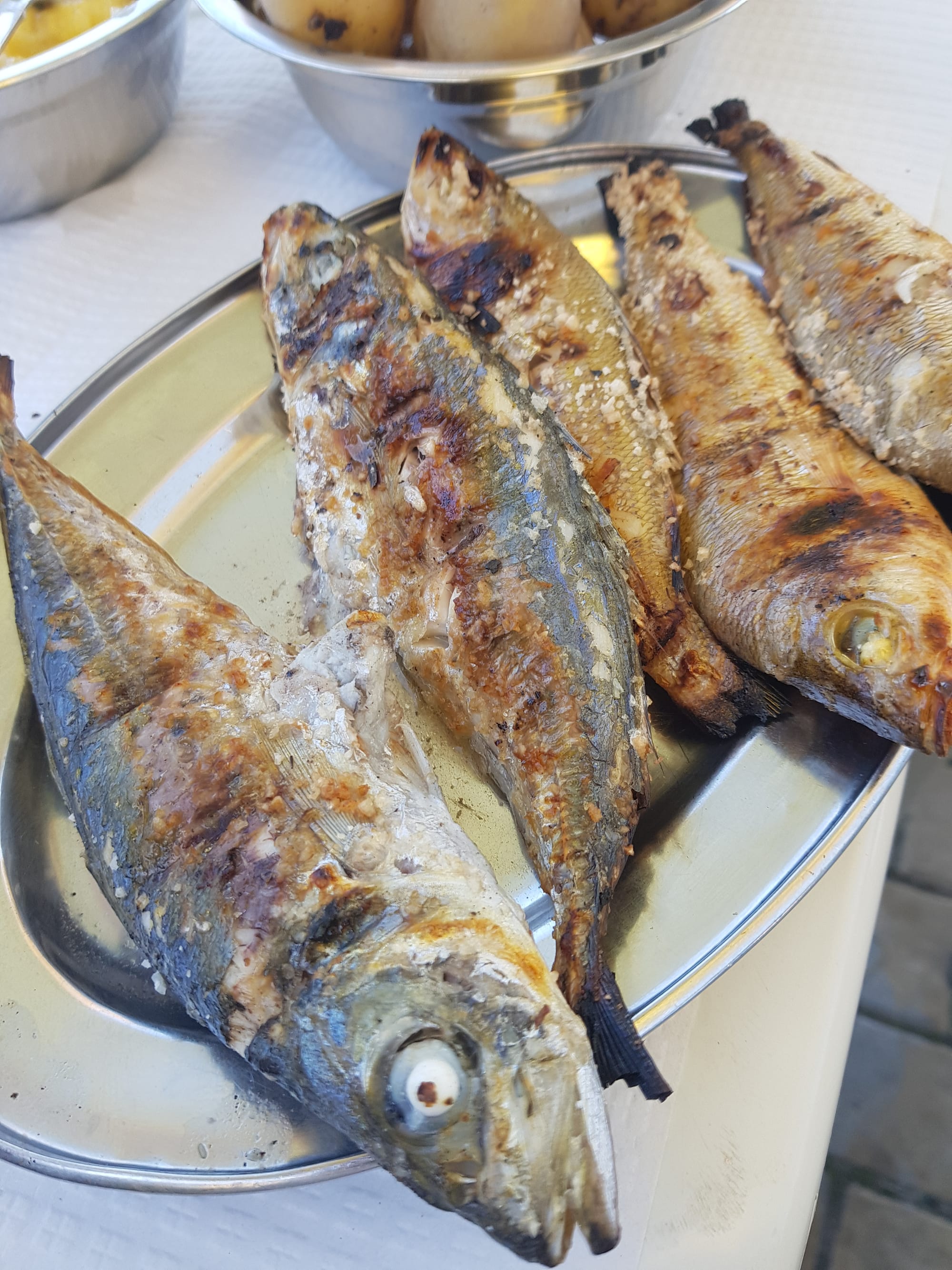
We went to a restaurant in a public park on the banks of the estuary, just north of the train station. It is a bizarre bit of public works. It has some public workout equipment, which is normal, but then also an amphitheater. Which faces west, meaning it’s completely useless in the evening when you might want to see a show there. It also has a 15 foot statue of an oddly-proportioned sea king guy, with a plaque about the ancient and classical history of Faro, and also of Atlantis. The restaurant is in an isolated cluster of houses on the edge of the concrete.
We got (without asking for anything yet) a tomato salad, some polenta, olives, bread that had been drenched in a spiced olive oil, and then four or five platters of different kinds of fish – sardines, mackerel, hake, a bunch with Portuguese names that I cannot remember and cannot translate. It was not a sane amount of fish. All had been rubbed with garlic and olive oil before being grilled, and all were fabulous. We did our best, but many remained on the plates.
"Don't worry, we feed the leftovers to the animals," our waittress told us. Several extremely self-assured pigeons strutted around us.
Adjika-smoked turkey
A story: Turkey (the country) does not have spicy food. They think they do. But unless you’re in the southeast, you’re limited to shoving tiny pickled peppers into your kebabs.
When Jari and I were living there together, we got a hankering for the hot sauce we’d had in Georgia. Jari found this Soviet-era documentary about traditional adjika production in the Abkhazia region, and we watched the entire 18 minutes, there on Orkun’s couch in Hasanpasa.
(Did any of you seriously think you would read a food blog from Ernie Piper and not be subjected to an incomprehensible audiovisual mashup of foreign mountain grandmas smashing stuff with rocks? The people in the video aren’t even speaking Russian. It’s the near-extinct and deeply fucked-up language of Abkhaz, which has 54 consonants, including some truly bizarre and unique ones like the labialized pharyngealized uvular fricative (functionally a gargle combined with a w), but only two vowels. Both of which are used in Adjika.)
Jari made a batch of Adjika right after watching that clip. I can still taste it, in my memory, in Orkun’s kitchen – that first spoonful was the most alarming thing I’d ever put in my mouth. Raw garlic and bitter herbs carry the initial burn, and then a terrifying amount of crushed red or green chilis do the real damage. “Alarmingly hot” is still how we describe the Platonic ideal of Adjika.
Jari has continued making batches of Adjkia occasionally, to punish himself, I can only imagine, and he gave a recent batch to Brian. Brian then marinated two turkey (bird) legs in Adjika, and then smoked it on the grill. I took a video of Brian carving the Turkey and laid down some hugely annoying and overenthusiastic commentary as if I were a food "content creator" and "influener", which to some degree I suppose I am, and he's ignoring me while I crack myself up, which is probably wise.
